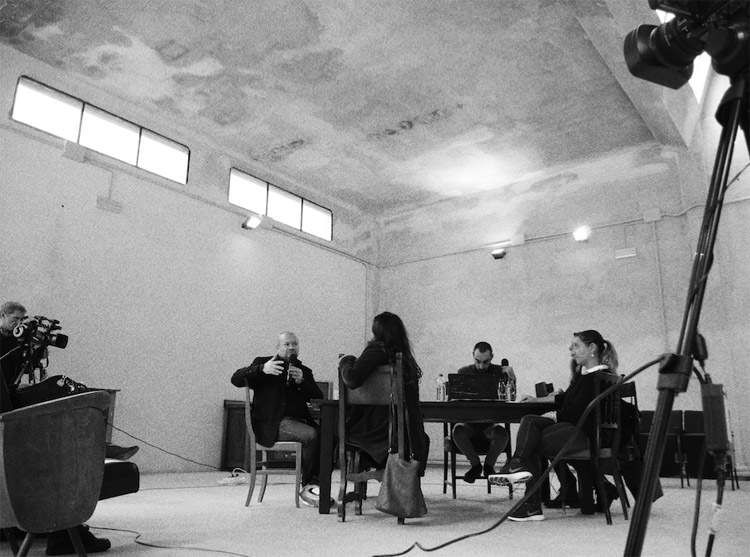By now, most artists work on social and political issues, with the only result being that they have produced a contradiction: they have convinced administrators and officials to make specific calls and competitions focused only on the social and political gaze. But they are ineffective and risk being only fatuous smokescreens when social and political issues, as Mario Perniola says, have no real counter-evidence. The debate on art and politics today risks being only a cliché: as one notices a real counter-evidence in art only in exhibitions and the occasional fair. The limitation of this practice is that it increasingly resembles a pose. So far we have exposed Favelli’s critical provocation.
However, meeting vis à vis under the pretext of making art and politics, sharing thoughts and projects, recognizing oneself as an artist protagonist of an action even setting aside one’s own narcissistic impulses, is still important and constitutes the leitmotif that emerged from the Transpolitica roundtable conceived by Giovanni Gaggia. As the fruit of the meeting held in Ferrara last October 1, each intervention turned out to correspond to the most ancestral needs of humanity, albeit with a strong inclination to honestly reopen the debate on art and political engagement. The occasion of the International Journalism Festival served to stimulate a greater plurality of ideas: this is why we also asked Flavio Favelli for an opinion. His reaction could only be strong, decisive, and yet, even though it was opposed to the line of thought of the artists involved, it aroused great interest and further food for thought.
The Transpolitica meeting, a project curated by Daniele Capra and Serena Ribaudo, with the interventions of Angelo Bellobono, Bianco-Valente, Giovanni Gaggia, Stefania Galegati Shines, Isabella Pers, Tiziana Pers, and Giuseppe Stampone focused on some key points and posed some crucial questions always with the aim of addressing a brazen debate on fundamental issues. Among the many speeches and terms of discussion, themes such as sharing, networking, meeting were discussed. Punctual was the reflection of Giovanni Gaggia who highlighted how recognizing, approaching, sharing is already a political gesture, meaning, by this word, an action addressed to taking care of life and public affairs. No less marginal was theopinion of Stefania Galegati Shines, who focused on theaccentuated individualism of our times. According to the artist, however, despite the fact that nowadays leducation exclusively promotesindividualism, artists by nature are not at all, they still have a founding role in civil society. Even when working alone, in the studio, the goal remains sharing.
 |
| A moment of the Transpolitica meeting. Ph. Federica Zabarri |
Bianco-Valente is a duo, so their work is already born as sharing. Theirs is a permanent dialogue of two individuals who have decided to operate as a single artistic entity, with the intention of pursuing together with others (the citizens of Latronico) a common project. Giuseppe Stampone via Skype makes a reference to the ancient myth. When Narcissus refuses separation from his own image, with that gesture he only refuses confrontation with others. Likewise, the curator, art historian and critic argues Stampone should separate themselves from their own image and return to being able to penetrate situations and criticize them, not simply comment on them. They should be intellectuals capable of using quotation and notion, not to embellish a text or show their knowledge, but to create connections, bridges in History, between past and present.
It is Angelo Bellobono then who takes stock of the theme of the meeting. Meeting among artists is an important antidote to the widespread sense of egosolidarity that too much characterizes the art world. An encounter to be true can also become a clash, an exchange, a sharing, to continue to be able to perceive differences and values among the widespread mediocrity and indifference. For sisters Isabella and Tiziana Pers, to share a project is to tune in, to open a debate on issues of great urgency. On the sidelines of the long discussion thanks to Maria Letizia Paiato’s urging, the question about the future of this project came into play. In order for it to really have follow-through, it is important not only to continue to tighten proximities, act together, give each other a method to solidify affinities but also to prolong the discussion table over time, always keeping in mind that meaning is never to be found in the works or in the tangible things that have been accomplished. The real legacy of working elbow to elbow are the entanglements that are established between people, the experiences that are shared, the new stories that are lived together. A huge intangible heritage that can always be counted on.
Warning: the translation into English of the original Italian article was created using automatic tools. We undertake to review all articles, but we do not guarantee the total absence of inaccuracies in the translation due to the program. You can find the original by clicking on the ITA button. If you find any mistake,please contact us.